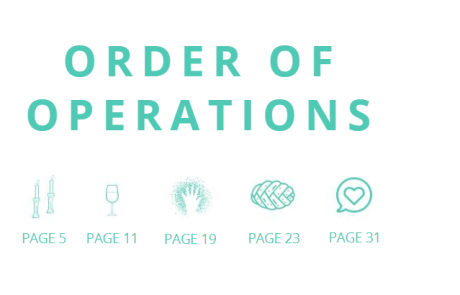Archive for August 2017
OneTable Shabbat Dinner Guide
Created by OneTable, a grassroots organization whose goal it is to help people enjoy Shabbat dinners together, the guide (39 pages) to the Friday night dinner experience provides both inspiration and optional formulae written for
Ashkenazi Grace After Meals (Audio + Text)
This recording presents the complete Grace After Meals according to Ashkenazi custom, sung with the modern Israeli pronunciation of Hebrew in a slow, clear voice to a popular melody. Performed by Sandy Bernstein, Chazzan
Shalom Aleichem in ASL
This video, presented by interpreter David Bar Tzur, demonstrates how to sign Shalom Aleichem in American Sign Language, which is especially helpful for those who are deaf or hard of hearing and those seeking
Nusach Sefard: Shalom Aleichem
This post includes the Hebrew, English and transliterated texts for Shalom Aleichem according to Nusach Sefard. Nusaf Sefard refers to the various forms of the Jewish prayers designed to reconcile Ashkenazi customs with the
Sephardic/Mizrahi Custom: Shalom Aleichem
This video demonstrates the Sephardic/Mizrahi tradition for Shalom Aleichem, which has five stanzas, instead of four, as is the common Ashkenazi custom. The additional verse, “B’shiv-t’chem L’shalom,” translated as “May your rest be for peace,”
Debbie Friedman’s Shalom Aleichem with Onscreen Transliteration
This video presents the operatic soprano, Rowna Sutin, performing Debbie Friedman’s original tune for Shalom Aleichem. Complete with onscreen transliterated text, this video is helpful for those who would like to learn the words
A Feminist Eishet Chayil Poem
In this post, Tamara Cohen, a Jewish feminist writer, activist and educator, shares personal memories of how her mother, a hard-working professional woman and feminist, was gratified to have Eishet Chayil sung to her at
Introduction to Eishet Chayil: Meaning, Origins, How To, English Text
This detailed article by Chaviva Gordon-Bennett provides a thorough introduction to Eishet Chayil, including the meaning, origins, and practical how-to’s of singing this song on Friday night, along with the English translation of the text. Published on ThoughtCo, a
How To Read Eshet Chayil: Reflections from a Feminist Scholar
This reflection by feminist scholar, Dr. Wendy Zierler, traces her evolving relationship with the words of Eshet Chayil over the course of her life. She suggests several ways of reading the text, exploring the Kabbalistic
A Creative Lesson Plan to Teach the Grace After Meals to Students
This twelve-part lesson plan from The Lookstein Center for Jewish Education aims to teach middle school students the meaning and purpose of the Grace after Meals, using it as a gateway to conveying the










